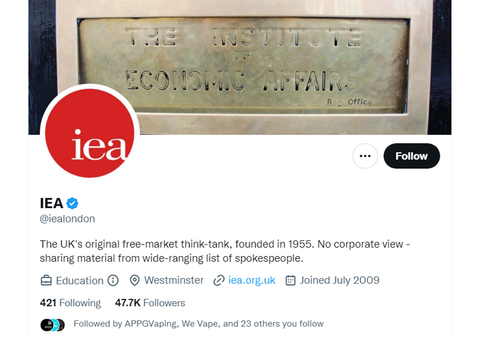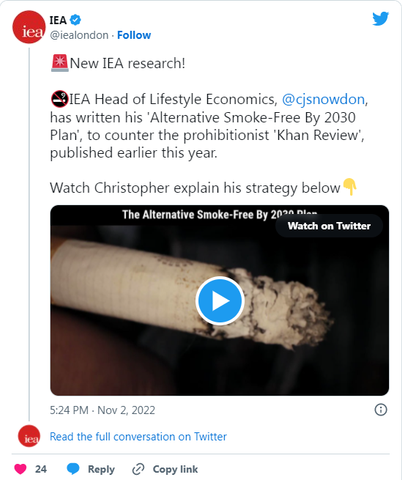
Christopher Snowdon who is the Head of Lifestyle Economics at the IEA (Institute of Economic Affairs – A “Free Market Think-Tank”) has published on November 2nd 2022 an Alternative Smoke-Free 2030 plan.
He is well known for being against strong Government intervention and the “nanny state”.

Christopher Snowdon – image courtesy of the iea.org.uk website
It goes so far as to say that the Khan review was “Prohibitionist” and states that only 53% of UK smokers actually want to quit and that they “enjoy smoking”.

It is not linked to the Government and there are allegations on Twitter of the IEA being Biased and funded by “Big Tobacco” – but I am only taking the report at face value.
Plus who knows what (if any) clout this will have on government policy. I have noticed that the IEA Twitter page is followed by the APPG Vaping (All Party Parliamentary Group for Vaping) account.

You can read the full document here but I will pick out some of my favourite bits…
Positives
The fact that vaping is safer than smoking has been mentioned which makes me happy…
“Although scare stories continue to appear in the media, no serious acute risks from vaping have been identified, and the Royal College of Physicians has concluded that the long term risks are ‘unlikely to exceed 5% of the harm from smoking tobacco’ (RCP 2019). There is very little evidence to support the theory that vaping acts as a ‘gateway’ to smoking. Only 0.4 per cent of people who have never smoked currently vape (ONS 2020). The British Medical Association has admitted that its earlier concerns about vaping ‘renormalising’ smoking ‘have not materialised’ (BMA 2017: 10).”
Also the subject of myths and misinformation has been clearly covered…
“Consumer ignorance is a major barrier to the consumption of low-risk nicotine products. Myths about vaping causing ‘popcorn lung’ and other diseases have proliferated on social media. Scare stories regularly appear in the press. As a result, a report from Public Health England concluded in 2021 that ‘Perceptions of the harm caused by vaping compared with smoking are increasingly out of line with the evidence’ (Public Health England 2021: 17). Four out of ten smokers in England wrongly believe that nicotine causes cancer and the proportion of smokers who wrongly believe that vaping is as dangerous or more dangerous than smoking rose from 36 per cent in 2014 to 53 per cent in 2020 (ibid.).
This represents a woeful failure of public health messaging which can be corrected in two ways:”
He then goes on to detail recommendations which he believes will achieve the Smoke-free 2030 goal.
He says that taxing e-liquid would be a disaster and called out Michael Bloomberg and his political manipulation – how ace is that…
“As of 2021, thirteen EU countries had an excise tax on e-cigarette fluid. This is a mistake. The economic evidence is clear that taxes on vaping lead to more smoking (e.g., Pesko et al. 2020). A few EU countries also have restrictions on the range of flavours available and there is currently a global campaign funded by the billionaire Michael Bloomberg aimed at encouraging governments to ban all e cigarette flavours apart from tobacco flavour. This should be resisted. Flavours are a fundamental part of vaping’s appeal to smokers.”
Another great paragraph covers the fact of how the EU have been pretty anti-vaping…
“Notwithstanding the constraints of EU membership, the UK has generally regulated e-cigarettes in a responsible manner, achieving public health objectives while respecting personal freedom. But public understanding of the relative risks of vaping has gone backwards in recent years and there is more to be done. The obvious place to start is with unnecessary EU legislation. Six of the twelve recommendations listed above involve EU Directives. “
He also wants people to get the facts about the low risks of nicotine…
“The other priority is to give the public accurate information about the relative risks of novel nicotine products and the (very low) risks of nicotine itself. With better education and a regulatory system that fosters innovation, smoking may one day become genuinely obsolete.”
Access to alternative nicotine products including vaping he believes will be vital in achieving this goal…
“An alternative strategy to prohibition, a proven failure, would be to emphasise the resounding success of vaping and other tobacco-alternatives in getting people off cigarettes. As of this year, 28 per cent of smokers have never even tried an e-cigarette. Removing barriers to consumers accessing safer tobacco alternatives is vital. “
Negatives
A few digs have been made at the Khan review – I quote…
“It should be remembered, though it is ignored in the Khan review, that smokers enjoy smoking. If they can derive a similar amount of enjoyment from using safer nicotine products as they derive from smoking, encouraging them to switch to such products will produce a net gain in societal wellbeing. ”
“Khan’s prohibitionist recommendations included the painting of all cigarettes brown or green, annually increasing the age at which one can buy cigarettes by one year, hiking tobacco taxes by over 30 per cent until a pack of cigarettes costs around £20, and much more.”
Thoughts
I did expect the Snowdon Smoke-Free 2030 Alternative plan to be more anti-vaping.

Apart from a few bitchy paragraphs about the Khan review and not favouring stricter regulation on cigarettes / tobacco and legal age restrictions – it is pretty positive for vaping and other forms of “Novel Nicotine”.
It is still unknown if the Government will take any of this on board or indeed even the Khan review!
However this document is not necessarily looking at things fully from a public health point of view. At the end of the day the IEA is all for Free Markets and Economy so may be swayed by the financial implications of the Khan review.
It certainly has had a lot of clicks on Social Media and there are some excellent points in the Snowdon document. Whatever the political motives it covers facts about Misinformation, EU bias and the need for adults to choose their methods for quitting smoking. So it is playing a part in sharing information – but whether people respect the IEA as a creditable source could prove an issue.
I quote from the Snowdon report – and thankfully this is a policy I can get behind…
“It is important to acknowledge that the UK has generally regulated e-cigarettes sensibly. But with a greater focus on articulating the benefits of switching to low-risk tobacco alternatives and relaxing the associated regulatory regime, smoking may truly become obsolete”
